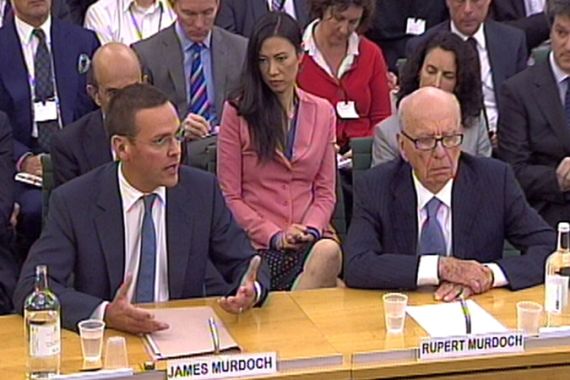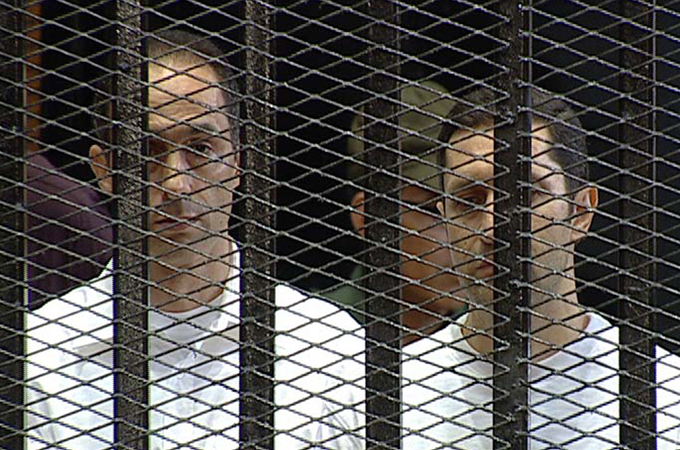Sins of the father & son
Murdoch and Mubarak trials are proving that the apple may not fall too far from the tree.

 |
| Mubarak sons guard their father during the highly viewed Mubarak trial [EPA] |
Accompanying the screenplay of his highly successful film Romulus My Father, starring Hollywood heartthrob Eric Bana, is an essay by Melbourne philosopher Raimond Gaita where he explains why he even wrote the story detailing the hardships of growing up with a damaged yet stoic man
“There is no single reason why I wrote Romulus, but I wrote it partly because I wanted to bear witness to, rather than merely record, or even celebrate, the values that defined my father’s moral identity … I am certain that the way people have been moved by it is inseparable from the fact that they believe it to be entirely without fabrication.”
The two trials
Gaita’s words are searing in the context of watching, and simultaneously tweeting during, the live coverage of the British House of Commons questioning of another Australian father and son – Rupert and James Murdoch over the News of the World phone hacking scandal. More viscerally for me yesterday though was watching, alongside my Egyptian flatmate who was in Tahrir Square earlier this year, the Mubarak boys carrying Qurans clad in white gowns and shielding their decrepit father Hosni Mubarak as he lies on a hospital bed behind bars. Truly a historical moment relayed live to the other side of the world. The burdens of bearing your fathers’ sins and vice versa were apparent in both of these media spectacles.
According to the Guardian’s reporter Andy Beckett, James Murdoch challenged his father regarding Israeli dispossession of Palestinians from their homes using choice expletives in front of Tony Blair – which is more than can be said for Mubarak’s sons regarding their stance on the Arab-Israeli question. But also, James was into hip hop so much so that he funded the legendary Rawkus Records label in New York in the mid-nineties that produced conscious hip hop artists such as Mos Def and Talib Kweli rapping about the tyranny of the system.
This should not come as a surprise where this generation bearing the burdens and expectations of their dictatorial fathers tend to lash out with their extravagant lifestyles and their increasingly out of touch rhetoric. But also it alludes to the murky and complicated entanglement of capitalism and politics that confounds and blurs the moral boundaries of leadership and autocracy.
Caliphs
Many commentators have drawn fact to the patriarchal politics that is at the heart of Arab despotism where governance is passed around like a gerontological baton from father to son –Syria, Jordan, Morocco & Libya.The sober voice of British investigative journalism Robert Fisk personally makes this connection too. He opens in article a couple of weeks ago with a description of Rupert Murdoch as “a caliph, I suppose, almost of the Middle Eastern variety. You hear all these awful things about Arab dictators and then, when you meet them, they are charm itself.”
But in his timely and interesting article he lapses into a casual orientalist racism that solidifies the image of the Arab leader as a demi-God or a father figure to his rebellious children that is the citizenry, who do not know their own political good. One who is invariably western educated and returns to run the family business of autocracy with an orientalist disdain for his country’s trivial problems of not having basic services and freedoms provided.
Gamal Mubarak’s arrogant and mocking response almost two years ago to a young Egyptian journalist asking him if the NDP is willing to negotiate with youth movements, who are still now camped in Tahrir Square, is a case in point.
More recently Thomas Friedman, as a self-proclaimed expert on the Middle East, quizzically puts forward in his latest Australian op-ed “once these regimes are shucked off, can the different Arab communities come together as citizens and write social contracts for how to live together without iron-fisted dictators?” Friedman still sees democracy and the unprecedented trial of a corrupt leader, who brutalized his people including my parent’s generation, anywhere in the world in a civilian court in his own country with due process as intrinsically outside of the Arabs’ political DNA.
Misunderstanding
What Fisk & Friedman, unfortunately albeit in different ways, are unable to recognize is the chaos of multiple technological, political, social, economic, religious and most of all age dynamics and split loyalties currently at play in the Arab street where there has been a lot of gains, and there’s still more to come!
Affecting real political change with their dogged persistence until now reveals that the idea of revolution itself in the Arab political lexicon is being complicated by the youth themselves. What is being witnessed not just in Tahrir but in other regional towns across Egypt and the Arab world are the organic operations and intricate mechanics of more than just an Arab Spring or summer. Yesterday’s trial is a reminder to the current Arab governments and other religious and political hierarchies in the west who prop them up not to peddle in false dreams of freedom that disillusioned our fathers decades earlier.
Farid Y. Farid is a doctoral candidate and freelance writer based at the University of Western Sydney.
The views expressed in this article are the author’s own and do not necessarily reflect Al Jazeera’s editorial policy.
